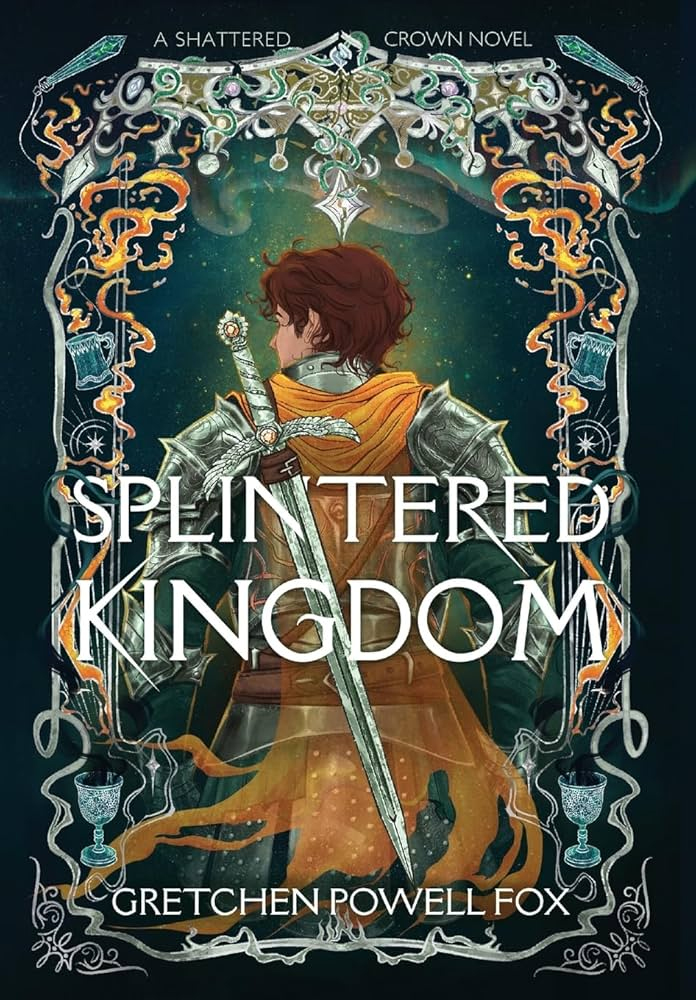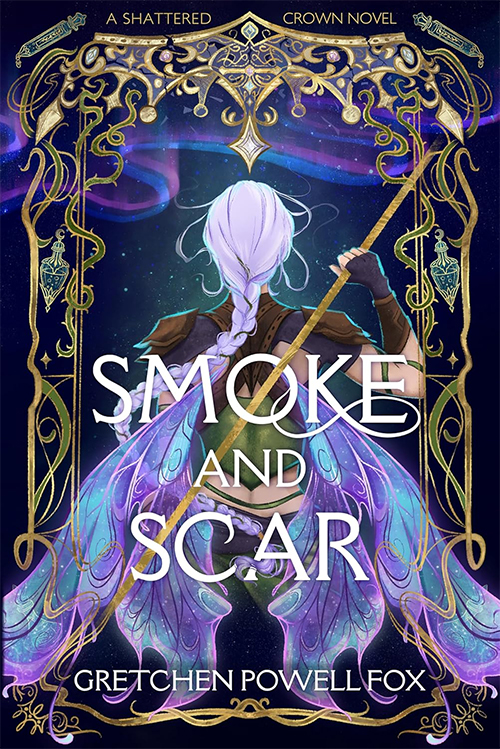Splintered Kingdom by Gretchen Powell Fox is the second installment in the Shattered Crown trilogy. It expands the world beyond the high-stakes tension of the Arcane Crucible and plunges Elyria and Cedric into the fragile aftermath. All the while, Elyria is learning to wield her shadow magic without letting it consume her, and Cedric is coming to terms with the truth of his own identity. As twin victors of the Crucible, they must work together to find both halves of the Crown of Concord in order to save Arcanis from collapse. Between political unrest, stunning betrayals, and the will-they-won’t-they tension still sizzling between the pair, nothing about this journey is going to be simple.

The truth has a way of hiding in the spaces between what is written.
Gretchen Powell Fox, Splintered Kingdom
What stands out most in Splintered Kingdom is how much bigger this universe becomes. In Smoke and Scar, the tension of the story came from a contained, brutal set of trials that compacted risk, characters, and plot into a tight space. Here, we’re invited into cities, borderlands, courts, and villages. We meet famine, piety, zealotry, poverty, the fierce solidarity of towns under pressure, and a spectrum of beliefs that test our heroes at every turn. The expansion of the setting amplifies the stakes as the narrative terrain is both emotional and geographical now. That shift allows Fox to lean more intentionally into the social commentary already pulsing beneath her worldbuilding. We see not only the effects of the missing Crown of Concord, but also what it costs ordinary people when political turmoil causes kingdoms to fracture.
Of course, the beating heart of this story still belongs to its characters. Elyria, Cedric, and the plucky crew we met in the Sanctum are magnetic as ever, even if they’re often separated this time around. But we also meet even more of their friends in Splintered Kingdom, and the experience is delightful! Tristan, in particular, is the standout favorite. Every scene he’s in becomes instantly more charming, more fun, more alive. (If Fox sees this, I would absolutely read an entire novella about him!) I also appreciate how Kit feels so much sharper and more grounded outside the Crucible, with arcs that nicely emphasize her wit, courtly intrigue, and strength of character rather than the single note of her (justified) rage as we saw during the trials. Nox and Thraigg, sadly, fade a bit to the background here, perhaps to make room for new characters and plot. Regardless, the ensemble overall remains a highlight for me. Fox has a way of writing even the smallest side character with enough depth that you care if they don’t make it out alive. It makes the reading experience so much more agonizing…and fun!
I was also glad to see LGBTQ+ representation handled with more care and attention, a welcome improvement on the first book that makes this world feel richer and more lived in. In my Smoke and Scar review, I noted that Tenebris Nox offered seamless nonbinary representation, yet the broader spectrum felt underexplored for a story that otherwise manages to showcase such a diverse fae world. In Splintered Kingdom, queer identities appear across core and side characters, folded into everyday dialogue, court dynamics, and found family moments without fanfare. The result is a story that reflects the breadth of its own world, and characters that feel more authentic because of it.
She did not want to admit that her power felt sharper, steadier whenever he was near. Did not want to admit to the hum of recognition, of belonging, she felt whenever his own power flared. Even now, her power flickered under her skin at the thought, as if her shadows, too, yearned to reunite with his fire.
Gretchen Powell Fox, Splintered Kingdom
The romance you signed on for also finally gets its moment, and the bell pepper-level spice of the first book definitely upgrades to a chili pepper or two for the sequel! In Smoke and Scar, Elyria and Cedric were too busy surviving the trials to do more than trade fleeting glances and hold the line on all that pent-up longing. In Splintered Kingdom, they have space to ask real questions, to decide what they want from each other, and how much of themselves they’re willing to give. The early intimate scenes between them are unquestionably the strongest, when they’re still feeling their way through a new romantic dynamic. There is a quiet vulnerability to how they explore that connection and surrender to their desire for one another. It feels earned after the enemies-to-lovers slow burn from the first book. For me, the love scenes in the second half of the book don’t have the same effect because they seem to exist for their own sake rather than in service of character or plot. I’m thinking of one specific love scene towards the end of the book when I say that. But for the most part, the evolution of their bond feels right. Cedric and Elyria are most effective when they don’t dull themselves down for each other, and that flickering tension—fire and shadow learning to move together—continues to work. Their arcs feel designed to slot together, to fill spaces the other left empty, which makes watching them get together incredibly gratifying and poetic.
One of the most rewarding through-lines in this series is its interest in power—not just the kind you cast or fight with, but the kind that shapes people and institutions. Cedric’s arc continues to be one of my favorites. Watching him unlearn the indoctrination he grew up with, challenge Lord Church’s legacy, and finally begin to see his own power as something worth embracing is deeply satisfying. Elyria’s journey with her shadow magic is also layered, since it’s about control but also about learning to live with the parts of yourself you were taught to fear. The book also sharpens its questions around mana magic: who gets to use it, what it costs, and whether a resource can be wielded without stripping the world that sustains it. I hope the final installment leans into that idea of stewardship, not just control, and shows what responsible magic might look like in a world that has already paid too much for convenience.
When you spend all your time trying to bury your power instead of learning how to use it, there is a bit of a steep curve to catch up.
Gretchen Powell Fox, Splintered Kingdom
That said, it bears noting that the first half of the novel drags. Given everyone is so worried about finding the crown and saving the kingdom, the fact that they’re willing to sit around and wait for permission to leave on that journey felt…odd. The characters—and readers—were trapped by plot necessity more than anything else. Sure, the excuse is that Lord Church is manipulating everyone because he doesn’t want our heroes to find the crown, but the sheer amount of time they spent waiting around just doesn’t feel convincing or believable when the world is supposedly on the brink. The writing also feels clunky in places, with repetition and awkward sentence construction that pulls you out of the moment. The pacing struggles under the weight of long exposition scenes and a few too many logistical detours. It’s not enough to undo the emotional resonance of the story, but it does dull the edge a bit.
Still, Splintered Kingdom holds its ground as a thoughtful, character-driven follow-up. It may not have the razor-sharp pacing of Smoke and Scar, but it makes up for that with expanded themes and wider emotional arcs. The final chapters deliver some gut-punch moments I didn’t see coming, and while the book ends with a clear setup for the final installment, it still feels like a full experience.
Thank you to the author, Gretchen Powell Fox, for sharing an advanced reader copy of her book in exchange for an honest review.

